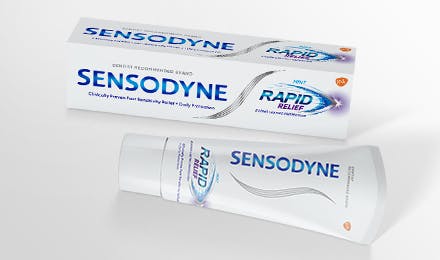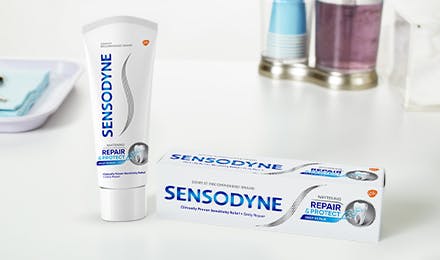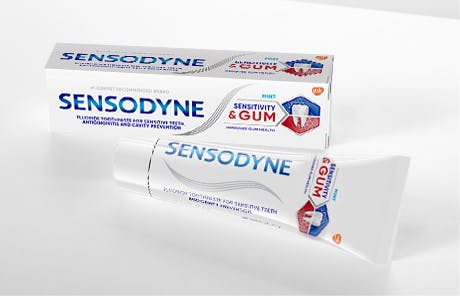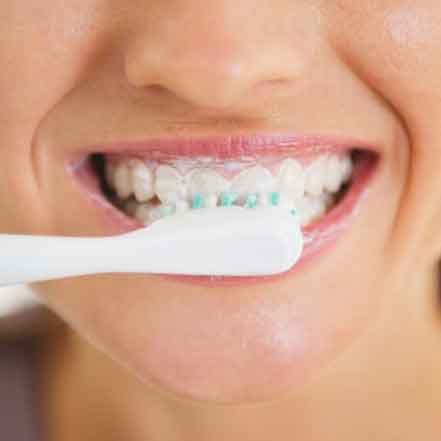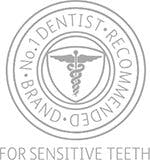What Can You Do About Sensitive Teeth?

Whether it’s a quick sip of hot coffee or a slurp of a chocolate milkshake, if you have sensitive teeth, enjoying your favorite foods may come with a side of pain. And it’s not just hot or cold food and drinks that can trigger the throbbing ache. Some people also experience pain when eating sweet, sugary, or sour food, too.
According to the Academy of General Dentistry, approximately 40 million people in the United States suffer from sensitive teeth. It can be a real pain in the mouth, not to mention it can interfere with your daily life. But is there some kind of relief for sensitive teeth, or are you just destined to suffer from overreactive chompers for the rest of your life?
What’s Behind Your Sensitive Teeth?
While it may seem like your teeth are just being fickle, there are several reasons why they may become hypersensitive to certain kinds of food and drinks.
The most likely culprit for sensitive teeth is worn-down tooth enamel at the gum line. Enamel is the hard, protective coating on the outside of your teeth. It’s designed to protect the soft tissue (also known as dentin) and nerves inside your tooth and keep bacteria and other irritants out. Similarly, under your gums, a layer called cementum protects the roots of your tooth.
When the enamel or cementum wear down, the dentin layer may become exposed, which leaves a direct line to your tooth’s nerves. So, when you eat certain foods — hot soup, tea, candy, or even a cold piece of fruit — it can feel like a shock of electricity as the food or drink stimulates your nerves.
Tooth sensitivity can also be a sign that there’s a cavity starting to nestle into one of your teeth (in which case you need to visit your dentist). The decay forms holes in your enamel, breaking down the integrity of the defensive layer and again, leaves your tooth vulnerable to irritation and pain. Chipped or cracked teeth can also lead to overreactive teeth.
Gingivitis, an early form of gum disease, is another common offender responsible for tooth sensitivity. Gum disease can cause your gums to recede, exposing your teeth’s hypersensitive roots.
Sensitive Teeth Relief
If you’re suffering from sensitive teeth, don’t worry. There are some simple methods to lessen the sensitivity of your teeth and keep the pain and discomfort at bay. Try these six tips for sensitive teeth relief.
1. Brush with toothpaste for sensitive teeth
Pick up a tube of toothpaste designed specifically for sensitive teeth relief like Sensodyne Rapid Relief, from the No. 1 dentist-recommended toothpaste brand for sensitive teeth. The active ingredient, stannous fluoride, builds a layer over exposed dentin to quickly create a protective barrier over the sensitive areas of your teeth. This is what helps keep outside triggers from reaching the nerves, providing clinically significant sensitivity relief in three days. Be sure to continue using it every day, twice a day.
2. Switch to a toothbrush with soft bristles
Using a hard-bristled toothbrush or scrubbing too vigorously can increase the sensitivity of your teeth by wearing down your tooth’s enamel and contributing to gum recession. If you aren’t using a soft toothbrush already, it’s time to switch. If you’re not sure if you’re being too heavy-handed with your brushing technique, check your toothbrush’s bristles. If they are flattened and frayed, lighten up. Use gentle, small circular or short back-and-forth motions.
3. Go easy on acidic food and drinks
Since food and beverages high in acid may contribute to enamel erosion, it’s best to cut back on these items, especially if you have tooth sensitivity. Food and drinks like citrus fruits, carbonated drinks, and wine can slowly wear away your tooth’s enamel over time. If you do consume acidic food or drinks, drink water afterward to balance the acid levels in your mouth.
4. Consider trying fluoride treatments
In addition to using desensitizing toothpaste and revamping your brushing technique, you may want to see your dentist. They may recommend an in-office treatment like applying fluoride, which can strengthen the tooth’s enamel.
5. Visit your dentist
In addition to seeing your dentist regularly, if your tooth sensitivity lasts for more than a few days, it may be a good idea to check in with your dentist. They’ll determine the extent of the problem and the best course of action, based on the exact cause. For example, if a cavity is triggering your pain, you may need a filling or crown (or a new one if your old filling has worn down).
If you’ve tried other options and your teeth remain hypersensitive and painful, your dentist may suggest a root canal, a procedure to clean the inside of your tooth and remove the nerve. With the nerve removed, your discomfort should disappear.
Even if you’ve been experiencing sensitive teeth for a while, it isn’t something you just have to “grin and bear” for the rest of your life — and you shouldn’t have to. Make a date with your dentist and talk to them about your options — it really could be as simple as heading to the drugstore and picking up a tube of Sensodyne toothpaste!


